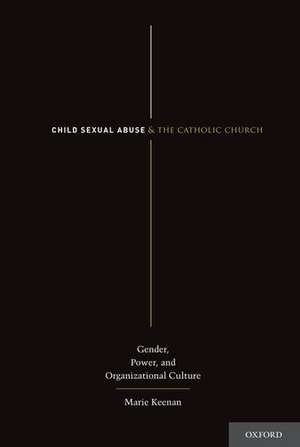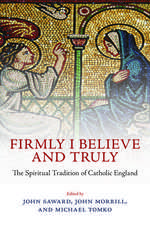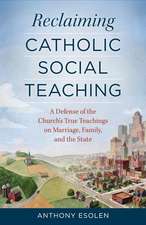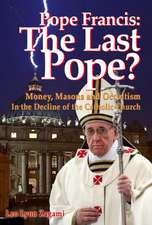Child Sexual Abuse and the Catholic Church: Gender, Power, and Organizational Culture
Autor Marie Keenanen Limba Engleză Paperback – 18 iul 2013
| Toate formatele și edițiile | Preț | Express |
|---|---|---|
| Paperback (1) | 335.69 lei 32-37 zile | |
| Oxford University Press – 18 iul 2013 | 335.69 lei 32-37 zile | |
| Hardback (1) | 559.76 lei 32-37 zile | |
| Oxford University Press – 29 sep 2011 | 559.76 lei 32-37 zile |
Preț: 335.69 lei
Preț vechi: 436.12 lei
-23% Nou
Puncte Express: 504
Preț estimativ în valută:
64.23€ • 66.93$ • 53.19£
64.23€ • 66.93$ • 53.19£
Carte tipărită la comandă
Livrare economică 24-29 martie
Preluare comenzi: 021 569.72.76
Specificații
ISBN-13: 9780199328970
ISBN-10: 0199328978
Pagini: 388
Dimensiuni: 155 x 231 x 23 mm
Greutate: 0.56 kg
Editura: Oxford University Press
Colecția OUP USA
Locul publicării:New York, United States
ISBN-10: 0199328978
Pagini: 388
Dimensiuni: 155 x 231 x 23 mm
Greutate: 0.56 kg
Editura: Oxford University Press
Colecția OUP USA
Locul publicării:New York, United States
Notă biografică
Marie Keenan, PhD, is a Researcher and Lecturer at the School of Applied Social Science, University College Dublin, and a member of the Advisory Board of the UCD Institute of Criminology. She is Chairperson of the Family Therapy Association of Ireland and a registered psychotherapist who has worked for over twenty years with survivors and perpetrators of sexual crime and their families, in community and forensic settings.
Recenzii
A must-read for thinking Catholics who are sincere in their attempts to find a way through the current crisis in the Church
Keenan skilfully identifies themes and interweaves respondents' narratives with available literature on abuse, sexuality, power, and Catholic culture. This, layered with an extensive examination of how Catholic bishops in Ireland and representatives of the Vatican have responded to claims of abuse, paints a vivid and meaningful picture of how the Catholic Church systemically and institutionally enabled abuse and continues to falter in managing its occurrence. Child Sexual Abuse and the Catholic Church offers a welcome addition to college libraries, therapy centers, and classroom discussions centered on organizations, gender, power, and the complex social construction of child sexual abuse.
Bravery, scholarly rigour and compassion are all found in abundance in Marie Keenan's illuminating and compassionate new book. This review can only hint at the riches contained in this wise and compassionate book.
Keenan's work is immensely useful... Apologies, shame and even strict 'zero tolerance' policies will not constitute the kind of structural reform that will begin to solve the problem in the Roman Catholic church. Only a 'new model of the church' will do. Keenan's hard-nosed and sophisticated book is a step in that direction.
Marie Keenan brings unusual perspectives and a depth of experience to the issue of sexual abuse within institutions... not omitting a feminist commentary on how the supposed great evil of sex with a mature woman might somehow make sexual activity with children less of a sin. There are lessons here for organisations beyond churches, especially where there are codes of confidentiality and loyalty, powerful hierarchies, and isolated institutions dealing with vulnerable people.
What I found especially valuable, though no doubt controversial, are the results of research into the point of view of the offending clergy. This is a timely and scholarly book.
It is impossible to do justice to this exceptional book in a review. It is perhaps the most significant book on the abuse crisis that has appeared in recent years. Dr Keenan, as she says herself, has offered a multi-layered analysis, involving complex relationships between the individual, organizations, and institutional processes. While she suggests that this is only one analysis among many, it deserves to be read widely and used as a reference point for further studies, where her conclusions and hypotheses can be tested and developed. This book does not make comfortable reading for anyone involved in the abuse crisis. I sincerely hope that bishops, superiors and those involved in formation will read it and allow its conclusions to influence their responses to the crisis, and their approaches to Church governance and theology.
While this book considers the problem of sexual abuse in the Catholic Church, it is much more than that. It provides very rich information and analysis in the areas of organisational culture, offending behaviour, therapeutic approaches and social commentary. The author's systemic conceptualisation allows insights to develop which helps the reader to consider the issue from a wider, multi-faceted perspective... this thought provoking book succeeds in hugely engaging the reader and provides hope that this problem can be addressed meaningfully in the future.
Keenan skilfully identifies themes and interweaves respondents' narratives with available literature on abuse, sexuality, power, and Catholic culture. This, layered with an extensive examination of how Catholic bishops in Ireland and representatives of the Vatican have responded to claims of abuse, paints a vivid and meaningful picture of how the Catholic Church systemically and institutionally enabled abuse and continues to falter in managing its occurrence. Child Sexual Abuse and the Catholic Church offers a welcome addition to college libraries, therapy centers, and classroom discussions centered on organizations, gender, power, and the complex social construction of child sexual abuse.
Bravery, scholarly rigour and compassion are all found in abundance in Marie Keenan's illuminating and compassionate new book. This review can only hint at the riches contained in this wise and compassionate book.
Keenan's work is immensely useful... Apologies, shame and even strict 'zero tolerance' policies will not constitute the kind of structural reform that will begin to solve the problem in the Roman Catholic church. Only a 'new model of the church' will do. Keenan's hard-nosed and sophisticated book is a step in that direction.
Marie Keenan brings unusual perspectives and a depth of experience to the issue of sexual abuse within institutions... not omitting a feminist commentary on how the supposed great evil of sex with a mature woman might somehow make sexual activity with children less of a sin. There are lessons here for organisations beyond churches, especially where there are codes of confidentiality and loyalty, powerful hierarchies, and isolated institutions dealing with vulnerable people.
What I found especially valuable, though no doubt controversial, are the results of research into the point of view of the offending clergy. This is a timely and scholarly book.
It is impossible to do justice to this exceptional book in a review. It is perhaps the most significant book on the abuse crisis that has appeared in recent years. Dr Keenan, as she says herself, has offered a multi-layered analysis, involving complex relationships between the individual, organizations, and institutional processes. While she suggests that this is only one analysis among many, it deserves to be read widely and used as a reference point for further studies, where her conclusions and hypotheses can be tested and developed. This book does not make comfortable reading for anyone involved in the abuse crisis. I sincerely hope that bishops, superiors and those involved in formation will read it and allow its conclusions to influence their responses to the crisis, and their approaches to Church governance and theology.
While this book considers the problem of sexual abuse in the Catholic Church, it is much more than that. It provides very rich information and analysis in the areas of organisational culture, offending behaviour, therapeutic approaches and social commentary. The author's systemic conceptualisation allows insights to develop which helps the reader to consider the issue from a wider, multi-faceted perspective... this thought provoking book succeeds in hugely engaging the reader and provides hope that this problem can be addressed meaningfully in the future.












